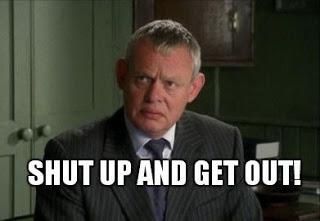The question is whether this is a reputation that we deserve. It's certainly true that conversations with people with Asperger's can be an “experience” but is this a self-centred superiority complex or simply the way that a bunch of traits appear to others… and if so, what can be done about it?
One Sided Conversations
 People with Asperger's often seem to dominate conversations, turning the topic to things that interest us (special interests) and then talking until the listeners make their escape.
People with Asperger's often seem to dominate conversations, turning the topic to things that interest us (special interests) and then talking until the listeners make their escape. To an outsider, this appears to be “conversation dominance”. It suggests that the “aspie” is not interested in the opinions and subjects of other people.
People with Asperger's are constantly thinking about their interests and apparently this isn't the case with “normal” people. When you're talking, you tend to say what you're thinking- and for us, it's pretty obvious what that is. In fact, it's hard for us to concentrate on other topics especially if, like “today's weather” or “last night’s sports game”, they seem to lack conversational depth.
This is an area where we can improve simply by trying to rein in our exposure of the special interest and trying to listen to others. It takes practice but it's an important skill to learn.
Being DirectPeople with Asperger's often ask very direct questions, for example asking an elderly person exactly how old they are or aggressively asking multiple questions about a given purchase which interests them.
Other people can interpret this as being “nosey”, pushy or simply rude.
People with Asperger's see this quite differently. It shows interest, engagement and sometimes honesty, all traits that we admire in conversation.
Personally I've always been proud of my honesty but over the years I've learned that there are some things that you just can't say. I now refrain from personal comments of any kind to such an extent that I've been accused many times of “not giving compliments”. In fact it's arguably the most difficult part of my marriage.
Too often my most well-meant comments are taken completely the wrong way. It's easier to completely avoid all personal comments than it is to say things that are intended as compliments but could all too easily have unintended consequences.
This is an area where others need to change their unrealistic expectations of us. Of course over the years, I've learned through trial and observation to avoid specific types of comments and questions - and my reading of body language has improved significantly. It’s probably safe to say that these problems should decrease over time with familiarity.
Blurting and Interrupting
 People with Asperger's syndrome are often seen to interrupt the conversations of others, simply blurting out what seems to be random facts. This leads others to presume that they consider their conversations to be more important or at best, that they are simply rude.
People with Asperger's syndrome are often seen to interrupt the conversations of others, simply blurting out what seems to be random facts. This leads others to presume that they consider their conversations to be more important or at best, that they are simply rude.Blurting can be a symptom of “over-excitement” in a topic or the urgent need to convey some information before it is forgotten. People with Asperger's usually have great long term memory but short term tends to be poor.
More often, blurting is the result of difficulty locating simple entry points into a conversation. It's not uncommon for a person with Asperger's to walk up to a conversation and watch it like a tennis match for a few minutes before silently walking away. This isn't rudeness, simply the person being unable to find the right “gaps” in which to enter a conversation. After a few such attempts, blurting is only to be expected.
In GeneralThere are many other nuances in “Asperger's conversation” but the answers usually boil down to the same things. Some things, the person with Asperger's needs to work on, some things develop naturally over time and sometimes others need to be more understanding and more accommodating.
The more time you spend listening to a person with Asperger's syndrome, the more you'll find yourself "acclimatizing" to their "peculiar" speech and world-view. If you're a regular watcher of either of the shows I mentioned earlier, think about how you feel about Doc Martin or Sheldon Cooper now versus how you felt about them in their earliest episodes.
The rudeness and the superiority complex that people with Asperger's syndrome often project is rarely intended as such.** Neither Doc Martin, nor Sheldon Cooper are specifically identified as "having Asperger's syndrome". though it has certainly come up on one, maybe both, shows. They're both characters based on real like people who are known by the actors and/or writers. Nevertheless, the characters they portray are very "aspie-like".

